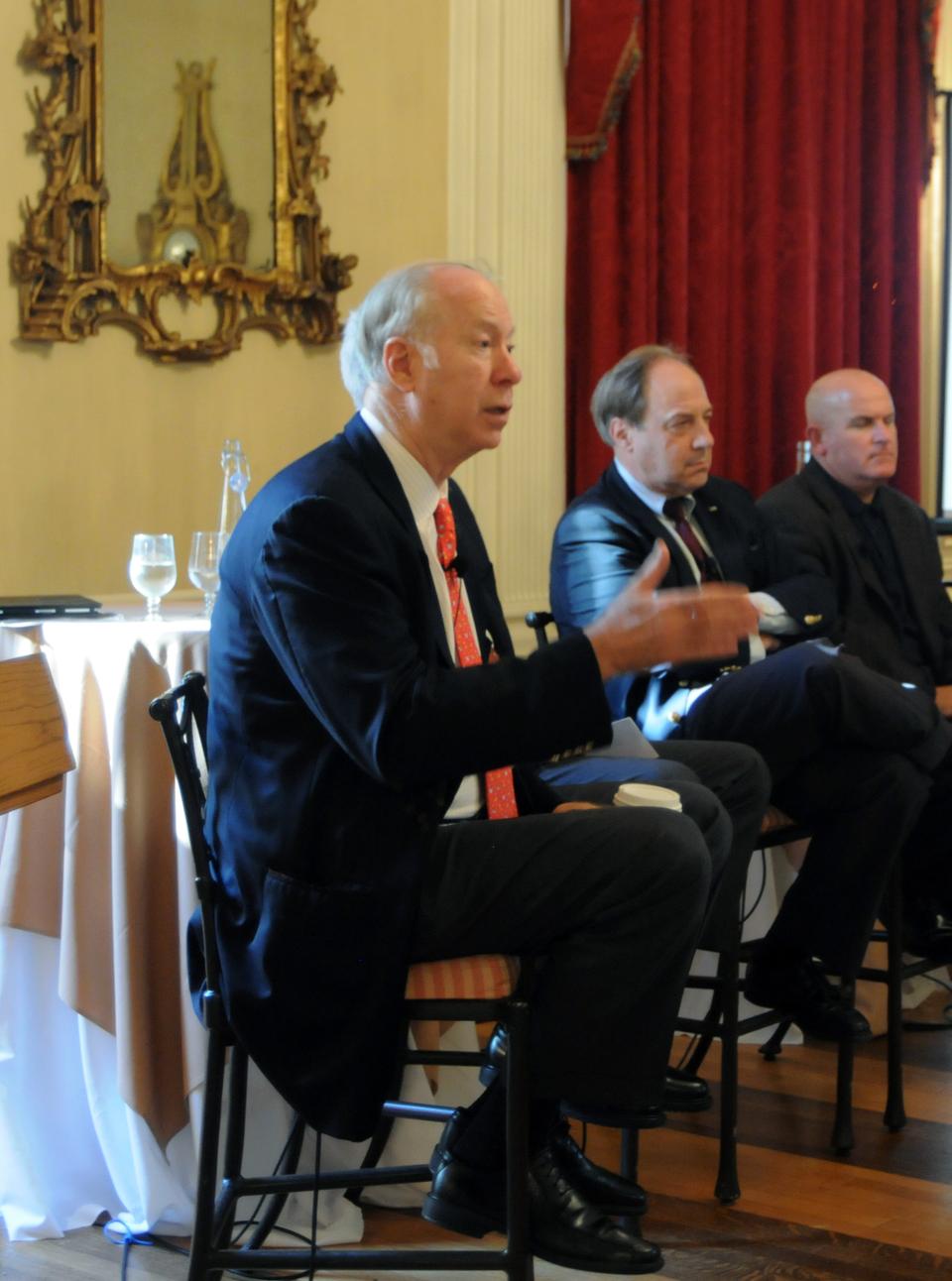
News
Garber Announces Advisory Committee for Harvard Law School Dean Search

News
First Harvard Prize Book in Kosovo Established by Harvard Alumni

News
Ryan Murdock ’25 Remembered as Dedicated Advocate and Caring Friend

News
Harvard Faculty Appeal Temporary Suspensions From Widener Library

News
Man Who Managed Clients for High-End Cambridge Brothel Network Pleads Guilty
In Rapprochement, University Hosts Welcome Reception For Veterans

For the first time in decades, Harvard hosted on Friday a “welcome reception” for students who are veterans, marking yet another step in the University’s recent efforts to repair relations with the military after nearly forty years of tension.
“We are very proud to welcome you to the Harvard family,” University President Drew G. Faust said in her opening remarks. “We are proud ... to claim each of you as our own ... We will continue to cultivate an environment in which military service is honored and rightly regarded as public service.”
The welcome, held in the majestic Loeb House ballroom, came a week and a half after Harvard celebrated the opening of an office for the Naval Reserve Officers’ Training Corps in the Student Organizations Center at Hilles.
ROTC withdrew from campus at the height of anti-Vietnam War protests in 1968 and was not recognized for nearly four decades. During that time students who wanted to participate in ROTC had to travel to the Massachusetts Institute of Technology for physical training and courses in military science.
The University announced in March that it would officially recognize Naval ROTC after the repeal of “Don’t Ask, Don’t Tell,” the policy that barred gays and lesbians from serving openly in the military.
According to Faust, the University is still in the midst of discussions with the Army and Air Force branches of ROTC about reaching a similar agreement, though a timeline for their return has yet to be established.
“We hope we can have the kind of the arrangement with the other services that we have with the Navy,” University President Drew G. Faust said.
Several speakers said that though Harvard has historically been unwelcoming of the military, relations have improved in recent years, especially during Faust’s tenure. Critics have said that while recognition is a good first step, Harvard still has a ways to go in making cadets and veterans feel welcome on campus.
“That requires an attitude change,” said Capt. Paul E. Mawn ’63 USNR (Ret.), chairman of the Advocates for Harvard ROTC. “It’s not a problem in the senior administration, it is in the faculty and in the general perception of Harvard.”
Harvard Kennedy School Dean David T. Ellwood and other speakers urged veterans to share their experiences in the military with their fellow classmates and to listen to classmates with differing views on the military.
“There is a great deal of misunderstanding about the nature of military service, about the nature of American military service, and this is a remarkable opportunity to share your insights and ideas,” Ellwood said.
Speakers gave credit to Faust, who is descended from more than four generations of military service members, for the recent reconciliation between Harvard and the military.
“She has from day one put an emphasis on public service, broadly defined, including military service,” Harvard Kennedy School Professor David Gergen said. “She has restored military service to its rightful place at Harvard.”
Ellwood echoed these sentiments.
“No one has been more committed to the involvement veterans here at the university, and the reason we have ROTC here and the reason we are the first [Ivy League] university to reinstate it is because of her personal efforts and great energy involved,” Ellwood said.
Since Harvard recognized Naval ROTC in March, other elite universities, such as Yale and Columbia, have followed suit.
Though the reception—which attracted a mainly male audience in gingham shirts and close cropped hair—was targeted at new students, many second and third year students also attended the event.
Regan Turner—a second year student in the joint Kennedy and Business School program, who served in the Marine Corps—said that he appreciated the University’s efforts to reach out to the military service members.
“This demonstrates that the school cares, and that vets shouldn’t feel awkward about their service but instead embrace it and share their experiences,” Turner said.
“I’ve come away very impressed by Harvard in the way they’ve made efforts during my past twelve months,” added Michael Harrison, a second year at the Kennedy School.
The choice of venue for the event was significant, and it was clear that after a 40-year absence the event sought to make a point of bringing members of the military back into the Harvard community. During World War II, Loeb House housed a Navy training program, but since then it has become the site of formal University meetings and functions for groups like the Harvard Corporation, the University’s highest governing body.
Friday’s event was held in the house’s lavish ballroom, a space with glittering chandeliers, a large fireplace with an expansive mirror above its mantle, and a parquet floor. The speeches were followed by an outdoor reception complete with waiters and white linens.
—Staff writer Tara W. Merrigan can be reached at tmerrigan@college.harvard.edu.
—Staff writer Zoe A. Y. Weinberg can be reached at zoe.weinberg@college.harvard.edu.
Want to keep up with breaking news? Subscribe to our email newsletter.
